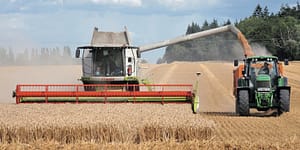Adding Our Voices to the Global Climate Strike

By Jill Kiedaisch, Content and Brand Manager
“If I have to face up to the reality of climate change as an 11-year-old, then so do you.”
The words of one of the countless youth speakers who shouted into microphones at “5,800 events in 163 countries” around the world last Friday, September 20, 2019.
Millions of people took time away from work and school to take to the streets in a powerful show of solidarity for climate equity and justice, kicking off a week of youth-led Global Climate Strikes that are changing the climate change conversation as we know it.
Here at Chelsea Green, president and publisher Margo Baldwin encouraged staff to take part in the strike as a paid workday. In an interview with Shelf Awareness, Margo spoke about her decision:
“We feel that it is the defining issue of our time. We have been publishing books about limits to growth and ecological destruction for over 30 years, as well as solutions based on regenerative agriculture, alternative energy and green building, and community resilience. We have been committed to reducing our carbon footprint and minimizing waste with the use of recycled and sustainably harvested papers since our founding in 1984. We stand in solidarity with our authors, practitioners and thinkers, who are working relentlessly to repair the earth.”
Vermont based Burton Snowboards shut down its website sales for 24 hours and redirected customers to the Global Climate Strike page. The entire Burton staffed marched three miles from their global headquarters to a rally in downtown Burlington, VT. They also transformed their brick-and-mortar stores into community gathering places for strikers before, during, and after marches. It was an employee organized and company supported effort with near 100% participation.

This resulted in the tech giant’s unveiling of an ambitious (albeit belated) “Climate Pledge” last week on the eve of the Global Climate Strike to transition to 100% renewable energy use by 2030 and to achieve net-zero carbon emissions by 2040—a whole decade ahead of the Paris Agreement target. To get there, the pledge outlined a $100 million reforestation effort and an order of 100,000 electric delivery vans to replace the diesel vehicles currently in use. Amazon has also promised to help companies in its supply chain decarbonize and will meet with other large corporations to compel them to sign onto the agreement as well.
Chelsea Green might not be Amazon, but we were one of two publishing houses in the US who joined the Climate Strike on Friday. If a 16-year-old girl on the other side of the world who started skipping school every Friday to protest on the steps of the Swedish parliament can spark a global movement 4 million people strong, then a book publisher with a mission to effect cultural change can certainly do its part.
And because it’s critical for each of us to examine the purpose behind what we do each day, the Chelsea Green mission, our company ground-truthing device for going on 36 years:
Our purpose is to reverse the destruction of the natural world by challenging the beliefs and practices that are enabling this destruction and by providing inspirational and practical alternatives that promote sustainable living.
Here are some images taken by Chelsea Green staff last Friday at Climate Strike events in White River Junction, VT; Burlington, VT; Norwich, VT; Sharon, VT; Brattleboro, VT; Unity, ME; Bellingham, WA; and Exeter, England.
Recent Articles
Oxeye daisies are one of the most important plants for pollinators including beetles, ants, and moths that use oxeye daisies as a source of pollen and nectar. Instead of thinking about removing a plant like oxeye daisy, consider how you can improve the fertility and diversity of habitat resources in your home landscape, garden, or…
Read MoreThis long-lived perennial legume is used for forage and erosion control. Kudzu is edible with many medicinal uses and other applications. Pollinators of all kinds love its prodigious lavender blooms!
Read MoreMove aside, maple! We have two new syrups to add to the table. Read on for insights on tapping, selling, and eating syrup from walnut & birch trees.
Read MoreWhy is modern wheat making us sick? That’s the question posed by author Eli Rogosa in Restoring Heritage Grains. Wheat is the most widely grown crop on our planet, yet industrial breeders have transformed this ancient staff of life into a commodity of yield and profit—witness the increase in gluten intolerance and ‘wheat belly’. Modern…
Read MoreDid you ever wonder how leeks, kale, asparagus, beans, squash, and corn have ended up on our plates? Well, so did Adam Alexander, otherwise known as The Seed Detective. The following is an excerpt from the The Seed Detective by Adam Alexander. It has been adapted for the web. My Seed-Detective Mission Crammed into two…
Read More


























































